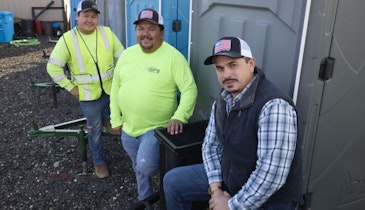Interested in Business & Technology ?
Get Business & Technology articles, news and videos right in your inbox! Sign up now.
Business & Technology + Get AlertsWhen participants at a roundtable discussion during last fall’s Portable Sanitation Association International Nuts and Bolts conference were asked about topics they’d like to discuss, John McGuire raised his hand. The future of disposal was on his mind. A chorus of other PROs at the table chimed in to say their dumping options were becoming limited too.
“Every other day on [wastewater industry] social media groups, it’s ‘Where can I dump? Where can I dump?’ So it’s obviously a national problem and that’s why I brought it up at the PSAI,” McGuire recalled during a recent phone interview. The business development manager for Rent-A-Can in Casa Grande, Arizona, (a subsidiary of ROX Group) went on to share his company’s present disposal dilemma. And once again he found out he wasn’t alone with his concerns.
Last June, Rent-A-Can was notified that the city of Casa Grande, located midway between Phoenix and Tucson in central Arizona, was soon to make two changes at its municipal treatment plant that would have a major impact on the restroom business. First, they announced a rate hike for processing portable sanitation waste from 3-4 cents per gallon to 25 cents per gallon. And second, they were no longer going to take waste generated outside of city limits.
And these changes were going to take place the following month, in July. As you can imagine, the announcement sent Rent-A-Can leaders into crisis mode trying to figure out how this would alter their business outlook. It wasn’t a pretty picture.
“That’s an 800% increase for us. We were quite taken aback by that,” McGuire says. Aside from the price increase, the new border restrictions are a burden. “We do have one or two large customers in the city, but 80% of our business or more comes from outside the city limits.”
NOT MANY CHOICES
The new rules were brought about by concerns over high BOD strength of the portable restroom and septage waste, use of formaldehyde for deodorizing, as well as treatment plant processing capacity, McGuire says. Prompted by meetings with area haulers, the city agreed to open treatment to waste from surrounding Pinal County, which covered 60-70% of the Rent-A-Can flow, but they have refused to make allowances on the per-gallon price.
“It still didn’t solve our problem in any significant way,” he says. “We went from $50,000 in dumping fees a year to $350,000 a year and that’s a big difference.”
Rent-A-Can approached 20 area municipalities to find more reasonable disposal options. None would accept the portable restroom waste, let alone provide a better price. The company ended up purchasing a $250,000 transport truck and now runs a daily route to a private waste processor in Phoenix that charges 16 cents per gallon.
The company is also considering setting up its own treatment operation that would empty directly into the Casa Grande sewer. Rent-A-Can offered to set up an operation to screen out trash and trickle the waste stream into the sewer line so it doesn’t have as big of an impact. But the city is requiring effluent to be treated to the strength of residential waste and that would require the company to invest an estimated $1.5 million. Even then, the city would not reduce the per-gallon rate.
“It’s been quite a blow to our operating costs,” McGuire says. “It’s difficult for us to be competitive. It’s not only an operational and actual bottom line hit, but can we raise our prices to cover this and still be successful in the industry? Will our customers understand this?”
No decision has been made on Rent-A-Can creating its own treatment operation. Another option would be for the company to relocate to Phoenix, which has a tiered system that would offer lower rates, or where the company could reduce its transport costs for waste going to a private facility there.
Rent-A-Can isn’t the largest or smallest restroom provider in the state. ROX Group bought out an existing PRO three years ago and grew the business from 700 restrooms to about 2,000. It currently has about 25 employees and serves customers in the Phoenix to Tucson corridor with a population of about 6 million. It’s been a great industry to add to real estate, publishing and other ventures the company owns.
A KEY TO LOCAL GROWTH
The area is experiencing a development boom. Factories including a new electric car plant are located near Casa Grande and housing is also growing. All of these generate new business for Rent-A-Can, and portable sanitation continues to be in high demand.
McGuire just wished the cities could be more flexible in serving portable restroom companies.
“I don’t know what these people expect us to do. The portable sanitation industry isn’t going anywhere. All of these cities have construction and events,” he says. “On one hand the city is using us, and on the other hand, the city is making it difficult for us to use them. It’s a conundrum.”
McGuire wants local officials to realize how sudden price spikes and service cutoffs impact small wastewater businesses and look for ways to phase in price increases or reduce flows they accept. When you hurt portable restroom businesses, you’re hurting builders, special events and others who require essential sanitation service, he says.
“There really is no perfect solution,” he added “So we have to all work together to come up with something. There needs to be more of a regional or national solution discussed.”
McGuire realizes some PROs haven’t faced these issues and continue to enjoy low disposal rates and no capacity issues at their local plants. That’s the way it was for decades for haulers in Casa Grande, he says. “But who knows when it’s going to rear its ugly head anywhere?”
JOINING FORCES
You don’t have to convince Jason Birdsong that disposal is a widespread issue in need of a comprehensive solution. Birdsong, president of the Oklahoma Onsite Wastewater Association and vice president of the National Association of Wastewater Transporters, hears the concerns from McGuire and others and joined the roundtable with this issue on his mind.
“A nationwide pandemic is where it’s headed,” he says. “You start turning the haulers away, they’re going to find someplace to dump it and it might not be legal. Even people that try to do things right hit their wit’s end when they’re beating their heads against the wall. They have no alternative but to not do things the right way to survive.”
Birdsong is president and CEO of JT Septic in Claremore, Oklahoma. He is concerned about pumpers and portable sanitation companies finding and affording disposal opportunities moving forward. He’s also worried about future generations of wastewater professionals and preserving the environment.
“I want it to be better for her than when I started,” he says of his daughter who could take over the business one day. “I want the environment to be friendly for my grandkids. If there’s no regulations or regulatory monitoring of the regulations, it’s going to get worse and somebody, somewhere down the line is going to pay the price.”
One possible way to move forward, according to Birdsong, is to require municipalities to allow disposal access to pumpers and PROs if they take state or federal money to upgrade wastewater treatment plants. Education of local government officials is also key. Haulers and treatment plants need to work together to solve issues of capacity and wastewater strength, and testing loads for hazardous materials.
Birdsong is not sure private companies alone can process the waste.
“I think I speak for many small businesses when I say it’s not economically feasible for me to purchase a $2 million treatment plant, or to purchase a 7,000-gallon tanker and haul it three hours,” he says.
Birdsong promotes creating a federal roadmap to address the inevitable increase in wastewater from portable sanitation and septic service companies. He would like to see the government, businesses and wastewater trade groups organize to overcome the disposal issue.
“To me, the bigger the voice the bigger the squeakiness of the wheel,” he says. “Somewhere, at some point somebody is going to hear us. What I would say to the feds is, ‘Does an environmental pandemic have to happen before you realize the seriousness of this?’”
A PROACTIVE MOVE
Sarabia’s Portable Jons/Blue Sanitation in El Paso, Texas, has been proactive in dealing with disposal issues for many years. More than a decade ago, the company worked with the city of El Paso to set up its own dump station that sends wastewater directly into the municipal sewer. The company’s president, Monica Brown, says that move — made by the former owner, her late sister Lorraine Wardy — was very forward-thinking.
Route drivers can dump their loads anytime at the company yard. A screen traps trash from the restrooms, which is transferred to a dumpster and goes to a landfill. The waste then moves into a grinder tank before entering the sewer system. The city periodically monitors the waste stream and gives a report to the company.
The arrangement has become more important to Sarabia’s operations since the city closed the disposal station used by all haulers five years ago. Brown says other haulers are transporting their waste greater distances in tankers to find a place to dump. That can mean driving five hours one way to Odessa, Texas, a trip her crew luckily hasn’t had to make.
“When [the city] closed, we were totally privileged to have what we have,” says Brown, who also attended the PSAI conference and heard the concerns of others. “We can operate 24/7 and that gives us a very competitive edge over everyone else. I feel for my competitors because those that don’t have a discharge area in their own yards have a real hard time.”
Learning of disposal options being threatened for so many PROs, Brown recommends others working with their local treatment plant officials and considering whether they can set up their own dump sites where practical.
“If they can get a permit like mine or any kind of an option to do it in their own facility, that’s the best bet,” she says.
WHAT SAY YOU?
Let’s expand the disposal conversation started at the PSAI roundtable. What is the situation for your restroom company and throughout your region? Have your disposal fees been raised recently, and how have you changed your operation to cope with that? Would you be willing to join a trade association and jumpstart lobbying efforts for more funds to treat private sources of wastewater? Drop me an email at editor@promonthly.com. I’ll share your thoughts with the rest of the portable sanitation community.





